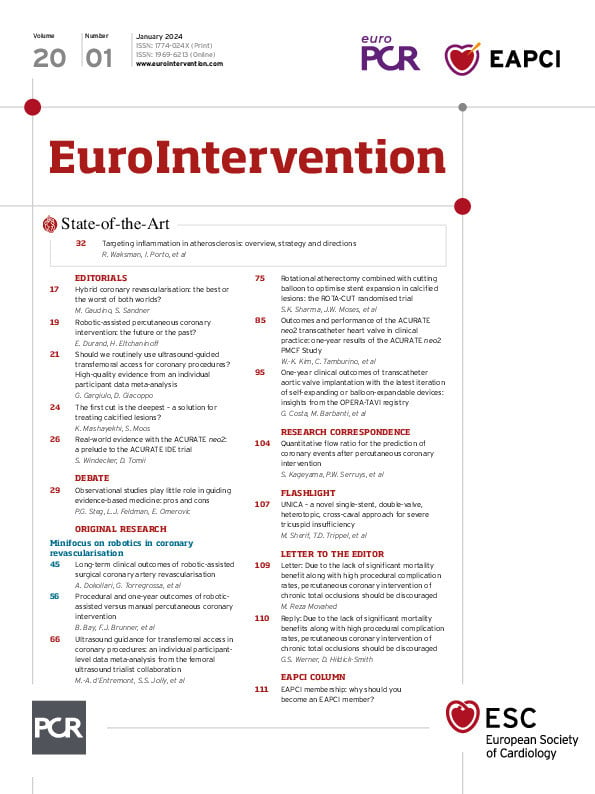The author of the letter expresses concerns about percutaneous coronary intervention (PCI) for chronic total coronary occlusions (CTO)1. The author cites a “very high” complication rate in studies that compared successful and unsuccessful CTO PCI procedures. Failed procedures are associated with higher complication rates than successful procedures, certainly, and indeed the randomised EuroCTO study confirms this observation. We found a significant increase in complication rates after failed procedures, but successful procedures resulted in outcomes that were better than with medical management2.
The author comments that in US community hospitals, complication rates for CTO PCI are higher than for non-CTO lesions3. This is not surprising. CTO PCI is a highly complex procedure and, when undertaken by non-specialist operators, has a lower procedural success rate and a higher complication rate. There is a clear relationship between volume and outcome4. CTO PCI is not a routine procedure to be performed by any operator in every institution. It requires training, experience, and familiarity with dedicated equipment and techniques. Indeed the EuroCTO club has emphasised the need for dedicated CTO PCI operators and centres and has produced a generic consent form5.
CTO PCI has not shown a mortality benefit in randomised trials, and certainly patients should not undergo CTO PCI in the mistaken belief that it will prolong life. However, the main goal of all elective PCI is to improve symptoms. The EuroCTO randomised trial showed that CTO PCI is superior to antianginal treatment acutely and during follow-up2. Dr Movahed suggests that CTO PCI be reserved only for “severe resistant angina”. This seems illogical. Antianginal medication, like CTO PCI, has no effect on prognosis. But antianginal treatment only alleviates rather than eliminates symptoms6 and may come at the cost of significant side effects7. In this setting, a single targeted intervention by an experienced CTO PCI operator may well be preferable to lifelong suboptimal systemic therapy, and we should give patients the option after an informed consent to decide which therapy modality they would prefer.
Conflict of interest statement
G. Werner reports speaker honoraria from Asahi Intecc, Abbott Vascular, Daiichi Sankyo, OrbusNeich, Philips/Volcano, Siemens, and Terumo. D. Hildick-Smith has no conflicts of interest to declare.

